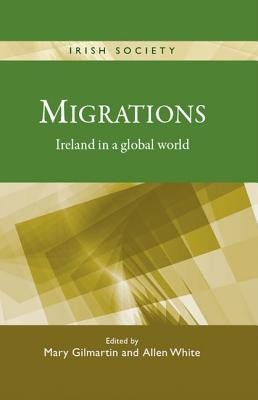
- We will send in 10–14 business days.
- Publisher: Manchester University Press
- ISBN-10: 0719085519
- ISBN-13: 9780719085512
- Format: 15.5 x 23.6 x 2.5 cm, hardcover
- Language: English
- SAVE -10% with code: EXTRA
Migrations CB (e-book) (used book) | bookbook.eu
Reviews
Description
This edited collection explores Ireland's complex relationship with migration in novel and innovative ways. The contributors - leading scholars of migration from the disciplines of anthropology, geography, history, media studies, sociology, sociolinguistics and women's studies - draw on new research to provide insights into emigration from and immigration to Ireland, both past and present. The chapters, which range from the nineteenth to the twenty-first century, cover topics as diverse as migrant women and children in Ireland, the role of the Irish Catholic in migration networks, and recent Irish migration to Australia. They are organised around three cross-cutting themes: networks, belonging and intersections. They focus on the migratory process rather than on migration as a uni-directional movement of people. Though centred on Ireland, the collection has broader implications for the ways in which migration is conceptualised. The collection will appeal to scholars of migration
and Irish studies, and to readers with backgrounds in a range of social science and humanities disciplines, including geography and sociology.
EXTRA 10 % discount with code: EXTRA
The promotion ends in 12d.12:44:42
The discount code is valid when purchasing from 10 €. Discounts do not stack.
- Publisher: Manchester University Press
- ISBN-10: 0719085519
- ISBN-13: 9780719085512
- Format: 15.5 x 23.6 x 2.5 cm, hardcover
- Language: English English
This edited collection explores Ireland's complex relationship with migration in novel and innovative ways. The contributors - leading scholars of migration from the disciplines of anthropology, geography, history, media studies, sociology, sociolinguistics and women's studies - draw on new research to provide insights into emigration from and immigration to Ireland, both past and present. The chapters, which range from the nineteenth to the twenty-first century, cover topics as diverse as migrant women and children in Ireland, the role of the Irish Catholic in migration networks, and recent Irish migration to Australia. They are organised around three cross-cutting themes: networks, belonging and intersections. They focus on the migratory process rather than on migration as a uni-directional movement of people. Though centred on Ireland, the collection has broader implications for the ways in which migration is conceptualised. The collection will appeal to scholars of migration
and Irish studies, and to readers with backgrounds in a range of social science and humanities disciplines, including geography and sociology.


Reviews